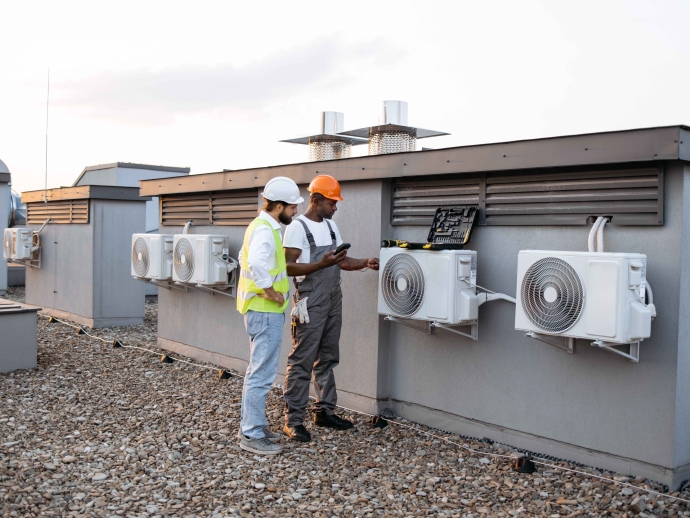Variable Refrigerant Flow Systems: The Future of Commercial HVAC Efficiency

As a business owner, you're likely familiar with the constant challenge of managing operational costs. For many commercial spaces, especially in the DFW area where temperatures can swing dramatically, HVAC expenses represent a significant portion of monthly overhead. Enter Variable Refrigerant Flow (VRF) systems – a revolutionary HVAC technology that's transforming how businesses approach climate control and energy efficiency.
Understanding VRF Technology
Variable Refrigerant Flow systems represent a significant leap forward from conventional HVAC solutions. Unlike traditional systems that simply turn on and off, VRF technology precisely modulates the amount of refrigerant flowing to each zone of your building. Think of it as having a dimmer switch instead of just an on/off button – this granular control allows for much more efficient operation and better comfort management.
Key Benefits for Business Owners
The advantages of VRF systems are compelling, particularly for commercial property owners. Most notably, these systems can achieve energy savings of 30-40% compared to conventional HVAC systems. This efficiency comes from their ability to operate at variable speeds rather than the all-or-nothing approach of traditional systems.
Beyond pure energy savings, VRF systems offer remarkable flexibility in zoning. Imagine being able to cool your sun-exposed retail space while simultaneously providing heat to north-facing offices – all with one system. This capability not only improves comfort but also eliminates the energy waste of overcooling or overheating areas unnecessarily.
The quiet operation of VRF systems is another significant advantage. With noise levels comparable to a quiet conversation, these systems won't disrupt customer interactions or office work. Additionally, their compact design frees up valuable commercial space that would traditionally be occupied by larger HVAC equipment.
Smart Integration and Future-Proofing
Modern VRF systems aren't just about heating and cooling – they're designed to integrate seamlessly with smart building technologies. Advanced controls allow for automated operation based on occupancy, time of day, and even weather forecasts. This integration capability means your HVAC system can adapt in real-time to changing conditions, further optimizing energy usage.
The scalable nature of VRF technology is particularly valuable for growing businesses. As your space needs evolve, the system can be modified or expanded without requiring a complete overhaul. Some cutting-edge installations are even combining VRF technology with renewable energy sources like solar power, creating hybrid systems that offer even greater efficiency and sustainability benefits.
Financial Considerations
While the initial investment in a VRF system may be higher than traditional HVAC options, the long-term financial benefits are substantial. Beyond the direct energy savings, these systems typically require less maintenance and have longer operational lifespans. When factoring in utility savings, reduced maintenance costs, and improved occupant comfort, many businesses find their VRF investment pays for itself within a few years.
Environmental Impact
In today's market, environmental responsibility isn't just good citizenship – it's good business. VRF systems significantly reduce a building's carbon footprint through their increased efficiency and reduced energy consumption. This environmental benefit can contribute to green building certifications and help businesses meet their sustainability goals, which increasingly matter to both customers and employees.
Taking the Next Step
For business owners in the DFW metroplex considering HVAC upgrades, VRF technology warrants serious consideration. The combination of energy efficiency, operational flexibility, and long-term cost savings makes these systems an attractive option for commercial spaces of all sizes. While every building's needs are unique, the adaptability of VRF systems means they can be customized to meet virtually any commercial requirement.
Ready to explore how VRF technology could benefit your business? Consider scheduling an assessment with a qualified HVAC professional who can evaluate your specific needs and provide detailed information about potential savings and implementation options.

